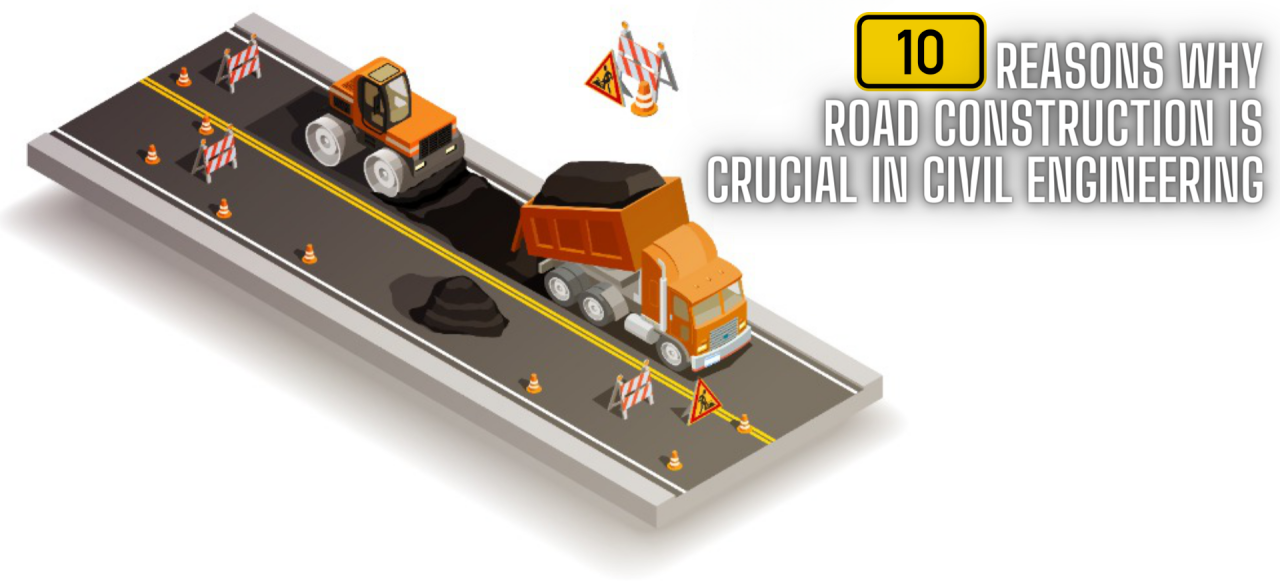
10 REASONS WHY ROAD CONSTRUCTION IS CRUCIAL IN CIVIL ENGINEERING
Introduction:
Road construction is a fundamental aspect of civil engineering, playing a vital role in connecting communities, facilitating transportation, and fostering economic growth. From highways to local roads, the construction and maintenance of transportation networks are essential for the development and progress of societies worldwide. In this article, we will explore ten compelling reasons why road construction holds immense importance in the field of civil engineering.
1. Enhanced Connectivity:
Road construction serves as a backbone for establishing and enhancing connectivity between various regions, cities, and towns. It allows people to travel efficiently, connecting remote areas with urban centers, enabling seamless transportation of goods and services. Improved connectivity contributes to economic growth, social integration, and accessibility to essential services like healthcare, education, and emergency services.
2. Transportation Efficiency:
Efficient transportation is a critical factor in economic development. Well-constructed roads reduce travel time, increase speed limits, and provide smoother rides, enhancing overall transportation efficiency. This leads to reduced fuel consumption, lower vehicle maintenance costs, and increased productivity for businesses. A well-connected road network also promotes public transportation, reducing traffic congestion and improving air quality.
3. Economic Growth:
Road construction plays a pivotal role in stimulating economic growth and development. Accessible transportation networks attract businesses, investments, and industrial developments. New roads and highways open up previously isolated regions, enabling the establishment of industries, tourism, and trade. Improved connectivity fosters job creation, increases market access for businesses, and stimulates local economies.
4. Urbanization and Infrastructure Development:
As cities grow and expand, road construction becomes essential to accommodate increasing population densities and urbanization. Civil engineers design and construct roads to manage traffic flows, reduce congestion, and enhance urban mobility. Well-planned road networks help in the efficient use of space, optimize land utilization, and integrate other infrastructure elements like drainage systems, public transportation, and utility networks.
5. Safety and Accident Prevention:
Road construction prioritizes safety and accident prevention. Civil engineers design roads with proper alignment, signage, and markings, taking into account factors such as visibility, speed limits, and traffic volume. Construction techniques focus on creating robust and durable road surfaces, reducing risks of accidents, and ensuring the safety of road users. Additionally, road construction incorporates features like pedestrian crossings, traffic signals, and roundabouts to enhance overall road safety.
6. Regional Development and Accessibility:
Road construction projects contribute significantly to the development of remote and underdeveloped regions. By providing access to previously inaccessible areas, roads enable the delivery of vital services, such as healthcare, education, and emergency assistance. Improved accessibility facilitates socio-economic development, reduces regional disparities, and enhances the quality of life for residents in remote locations.
7. Tourism and Cultural Exchange:
Road construction facilitates tourism and cultural exchange by connecting tourist destinations, heritage sites, and diverse cultural regions. Tourists and visitors can explore different regions conveniently, promoting local economies, hospitality industries, and cultural preservation. Well-designed roads also ensure easy access to recreational areas, national parks, and natural landscapes, promoting eco-tourism and sustainable development.
8. Disaster Management and Relief Operations:
During emergencies and natural disasters, road networks are critical for disaster management and relief operations. Well-constructed roads provide quick access for emergency response teams, enabling the efficient evacuation of affected populations and the rapid delivery of relief supplies. In disaster-prone areas, civil engineers design roads to withstand extreme weather conditions, ensuring resilience and the ability to restore connectivity swiftly.
9. Environmental Sustainability:
Road construction projects incorporate sustainable practices to minimize their impact on the environment. Engineers implement measures such as proper drainage systems, erosion control, and the use of environmentally friendly materials. Additionally, road construction can include features like green spaces, noise barriers, and wildlife crossings, minimizing disruption to ecosystems and preserving biodiversity.
10. Enhancing Quality of Life
Well-designed roads can enhance the quality of life of people in various ways. They can reduce travel times, improve access to essential services, and promote economic development. Moreover, well-constructed roads can reduce congestion and air pollution, which can have a positive impact on public health.
In conclusion, road construction is an essential aspect of civil engineering that plays a crucial role in promoting economic development, enhancing mobility, and improving the quality of life of people. By designing and constructing well-designed roads, civil engineers can promote sustainable development, improve road safety, and support disaster management efforts.To do that SHANASH INFRA is specialised in road construction in South India. For more details visit our website www.shanashinfra.in